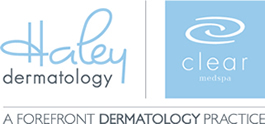Acne can be categorized as either inflammatory (red, painful bumps) or non-inflammatory (white heads and black heads). Treatment may include a combination of topical and oral therapy.
Eczema (Atopic Dermatitis) is a group of conditions characterized by itching and inflammation. Management usually includes topical and/or oral medication to decrease inflammation and to control flare ups.
The terms eczema or dermatitis are used to describe certain kinds of inflamed skin conditions including allergic contact dermatitis and nummular dermatitis. Eczema can be red, blistering, oozing, scaly, brownish, or thickened skin and usually itches. A special type is called atopic dermatitis or atopic eczema.
Rosacea is a very common inflammatory condition that causes redness and affects the nose, cheeks and forehead. Management can include oral and topical medications and laser treatments.
Psoriasis is a chronic skin disease that is classically characterized by thickened, red areas of skin covered with silvery scales. The extent of skin involvement can range from discrete, localized areas to generalized body involvement. The joints, nails, and mucous membranes may also be affected with the disease. Some cases of psoriasis are so mild that people don’t know they have it. Severe psoriasis may cover large areas of the body. Dermatologists can help even the most severe cases. Psoriasis is not contagious and cannot be passed from one person to another, but it is most likely to occur in members of the same family. In the United States, two out of every hundred people have psoriasis (four to five million people). There are approximately 150,000 new cases that occur each year.
Nail fungus or Onychomycosis is a very common fungal infection that causes thickening and yellowing of the nails on the hands and/or feet. Treatment options include oral medications as well as topical lacquers.
Hair loss encompasses a group of conditions that can be affected by hormones, stress and family history. Initial blood tests are usually performed to rule out other underlying conditions to determine treatment.
Most cysts are typically benign growths that can appear anywhere on the body. Treatment usually consists of a surgical procedure for successful removal.
Warts are benign tumors that commonly involve the skin and other epithelial tissues. The etiologic agents for these infections are a class of double-stranded DNA viruses called papillomaviruses. Warts are generally classified by their clinical features and morphology (e.g., common, flat, filiform) or by location (e.g., genital, plantar, respiratory papillomatosis).
Hyperhidrosis is a chronic medical disorder that results in the production of excessive sweat. A recent study determined that the condition – once thought to be rare – actually affects approximately 2.8 percent of the U.S. population, or 7.8 million people. Even more compelling, one out of three people surveyed with the condition said their sweating was intolerable or barely tolerable. Many sufferers said they were depressed and frustrated with daily activities, and they experienced interference with work and romance and had difficulty meeting people.
Skin tags are a very common benign growths that can appear on the neck, skin folds and around eyes. They are easily removed but are not always covered though insurance.
Rashes are a group of conditions characterized by inflammation and skin changes. A rash may be a sign of a chronic skin problem, such as acne, eczema, seborrheic dermatitis, or psoriasis.
Pigmentation or skin discoloration is a common condition in which brown to greyish patches form, usually on the face. Management always includes daily application of a reliable sunscreen and may include other prescription topicals.
Click here for Spa treatments
Molluscum Contageosum is a common condition among school aged children that is characterized by painless, skin colored bumps. Treatment may include surgical removal or topical medication.
HSVI is a common condition that is characterized by initial itching and then a group of fluid filled bumps appear. It is most successfully managed with oral antiviral medication or topical treatment.
A patch test is a method used to determine if your rash is caused by an allergic reaction to various chemical substances that commonly come into contact with the skin.
Skin cancer is the most common form of cancer in the U.S. and often a result of chronic sun exposure. If you notice any growth, changes, bleeding, or itching in moles or spots, it is important to see a health care provider.
Find out more info here…
PDT is a light based therapy for the treatment of actinic keratosis, pre-cancers. A topical solution, Levulan® Kerastick is first applied to the skin. The levulan is taken up by the damaged skin cells over the next hour. The patient is then placed under a Blue light which activates the Levulan. This destroys the pre- cancerous cells on the skin. This allows us to treat an entire area of skin instead of just 1 or 2 spots. Face, chest and arms are common areas we treat with this procedure. Although, we do see cosmetic benefits, this is usually covered by insurance companies as a medical treatment.
